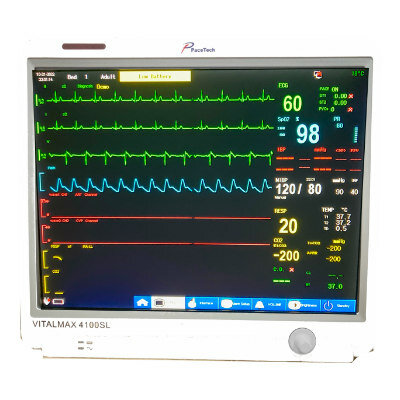AI-Based ICU Solution for Predicting Patient Deterioration Becomes Industry’s First Ever Device to Receive FDA Clearance
|
By HospiMedica International staff writers Posted on 09 Feb 2021 |

Illustration
A new artificial intelligence (AI) based ICU solution for predicting the likelihood of patient deterioration up to eight hours in advance has become the industry’s first ever device to receive clearance from the US Food and Drug Administration (FDA).
The FDA has given 510(k) clearance and authorized the use of “CLEWICU,” an AI-based ICU solution from CLEW Medical (Netanya, Israel), to predict hemodynamic instability in adult patients. The clearance is the FDA’s first for such a device, and follows the FDA’s Emergency Use Authorization (EUA) for the company’s respiratory deterioration model granted in June 2020, for the predictive screening of COVID-19 and other ICU patients.
The COVID-19 pandemic has underscored the critical need for quick and accurate decision-making in intensive care units, as ICU capacity has faced unprecedented volumes. Conducting effective risk evaluation to improve patient identification and subsequent care plans requires the use of advanced tools that can provide comprehensive, predictive data to help medical professionals identify patients whose health conditions are likely to deteriorate, in addition to patients whose conditions are unlikely to deteriorate.
CLEWICU continuously monitors and categorizes patient risk levels, providing clinicians with physiological insight into a patient’s likelihood of future hemodynamic instability. The system provides notification of clinical deterioration up to eight hours in advance, enabling early evaluation and subsequent intervention for prompt, proactive patient care. The system also identifies low-risk patients who are unlikely to deteriorate, thus enabling better ICU resource management and optimization.
The analytical software product uses AI-based algorithms and machine-learning models trained to identify the likelihood of occurrence of significant clinical events for patients in the ICU. CLEWICU receives patient data from various sources, including Electronic Health Record (EHR) data and medical device data. The data is analyzed in near real-time to present calculated insights and notifications for dedicated AI models and provides a picture of overall unit status.
“We are proud to have received this landmark FDA clearance and deliver a first-of-its-kind product for the industry, giving healthcare providers the critical data that they need to prevent life-threatening situations,” said Gal Salomon, CLEW CEO.
“AI can be a powerful force for change in healthcare, enabling assessment of time-critical patient information and predictive warning of deterioration that could enable better informed clinical decisions and improved outcomes in the ICU,” said Dr. David Bates, Medical Director of Clinical and Quality Analysis in Information Systems at Mass General Brigham healthcare system and CLEW Advisory Board member.
“CLEW’s AI-based solution is a huge leap forward in ICU patient care, providing preemptive and potentially life-saving information that enables early intervention, reduces alarm fatigue and can potentially significantly improve clinical outcomes,” stated Professor Craig Lilly, University of Massachusetts Medical School.
Related Links:
CLEW Medical
The FDA has given 510(k) clearance and authorized the use of “CLEWICU,” an AI-based ICU solution from CLEW Medical (Netanya, Israel), to predict hemodynamic instability in adult patients. The clearance is the FDA’s first for such a device, and follows the FDA’s Emergency Use Authorization (EUA) for the company’s respiratory deterioration model granted in June 2020, for the predictive screening of COVID-19 and other ICU patients.
The COVID-19 pandemic has underscored the critical need for quick and accurate decision-making in intensive care units, as ICU capacity has faced unprecedented volumes. Conducting effective risk evaluation to improve patient identification and subsequent care plans requires the use of advanced tools that can provide comprehensive, predictive data to help medical professionals identify patients whose health conditions are likely to deteriorate, in addition to patients whose conditions are unlikely to deteriorate.
CLEWICU continuously monitors and categorizes patient risk levels, providing clinicians with physiological insight into a patient’s likelihood of future hemodynamic instability. The system provides notification of clinical deterioration up to eight hours in advance, enabling early evaluation and subsequent intervention for prompt, proactive patient care. The system also identifies low-risk patients who are unlikely to deteriorate, thus enabling better ICU resource management and optimization.
The analytical software product uses AI-based algorithms and machine-learning models trained to identify the likelihood of occurrence of significant clinical events for patients in the ICU. CLEWICU receives patient data from various sources, including Electronic Health Record (EHR) data and medical device data. The data is analyzed in near real-time to present calculated insights and notifications for dedicated AI models and provides a picture of overall unit status.
“We are proud to have received this landmark FDA clearance and deliver a first-of-its-kind product for the industry, giving healthcare providers the critical data that they need to prevent life-threatening situations,” said Gal Salomon, CLEW CEO.
“AI can be a powerful force for change in healthcare, enabling assessment of time-critical patient information and predictive warning of deterioration that could enable better informed clinical decisions and improved outcomes in the ICU,” said Dr. David Bates, Medical Director of Clinical and Quality Analysis in Information Systems at Mass General Brigham healthcare system and CLEW Advisory Board member.
“CLEW’s AI-based solution is a huge leap forward in ICU patient care, providing preemptive and potentially life-saving information that enables early intervention, reduces alarm fatigue and can potentially significantly improve clinical outcomes,” stated Professor Craig Lilly, University of Massachusetts Medical School.
Related Links:
CLEW Medical
Latest Business News
- Johnson & Johnson Acquires Cardiovascular Medical Device Company Shockwave Medical
- Mindray to Acquire Chinese Medical Device Company APT Medical
- Olympus Acquires Korean GI Stent Maker Taewoong Medical
- Karl Storz Acquires British AI Specialist Innersight Labs
- Stryker to Acquire French Joint Replacement Company SERF SAS
- Medical Illumination Acquires Surgical Lighting Specialist Isolux
- 5G Remote-Controlled Robots to Enable Even Cross-Border Surgeries

- International Hospital Federation Announces 2023 IHF Award Winners
- Unprecedented AI Integration Transforming Surgery Landscape, Say Experts

- New WHO Guidelines to Revolutionize AI in Healthcare
- Getinge Acquires US-Based Medical Equipment Provider Healthmark Industries
- Global Surgical Lights Market Driven by Increasing Number of Procedures
- Global Capsule Endoscopy Market Driven by Demand for Accurate Diagnosis of Gastrointestinal Conditions
- Global OR Integration Market Driven by Need for Improved Workflow Efficiency and Productivity
- Global Endoscopy Devices Market Driven by Increasing Adoption of Endoscopes in Surgical Procedures
- Global Minimally Invasive Medical Devices Market Driven by Benefits of MIS Procedures
Channels
Artificial Intelligence
view channel
AI-Powered Algorithm to Revolutionize Detection of Atrial Fibrillation
Atrial fibrillation (AFib), a condition characterized by an irregular and often rapid heart rate, is linked to increased risks of stroke and heart failure. This is because the irregular heartbeat in AFib... Read more
AI Diagnostic Tool Accurately Detects Valvular Disorders Often Missed by Doctors
Doctors generally use stethoscopes to listen for the characteristic lub-dub sounds made by heart valves opening and closing. They also listen for less prominent sounds that indicate problems with these valves.... Read moreCritical Care
view channel
Deep-Learning Model Predicts Arrhythmia 30 Minutes before Onset
Atrial fibrillation, the most common type of cardiac arrhythmia worldwide, affected approximately 59 million people in 2019. Characterized by an irregular and often rapid heart rate, atrial fibrillation... Read more
Breakthrough Technology Combines Detection and Treatment of Nerve-Related Disorders in Single Procedure
The peripheral nervous system (PNS) serves as the communication network that links the brain and spinal cord to every other part of the body. It consists of two parts: the somatic nervous system, which... Read moreSurgical Techniques
view channel
Hydrogel-Based Miniaturized Electric Generators to Power Biomedical Devices
The development of engineered devices that can harvest and convert the mechanical motion of the human body into electricity is essential for powering bioelectronic devices. This mechanoelectrical energy... Read moreWearable Technology Monitors and Analyzes Surgeons' Posture during Long Surgical Procedures
The physical strain associated with the static postures maintained by neurosurgeons during long operations can lead to fatigue and musculoskeletal problems. An objective assessment of surgical ergonomics... Read more.jpg)
Custom 3D-Printed Orthopedic Implants Transform Joint Replacement Surgery
The evolving field of 3D printing is revolutionizing orthopedics, especially for individuals requiring joint replacement surgeries where traditional implants fail to provide a solution. Although most people... Read more
Cutting-Edge Imaging Platform Detects Residual Breast Cancer Missed During Lumpectomy Surgery
Breast cancer is becoming increasingly common, with statistics indicating that 1 in 8 women will develop the disease in their lifetime. Lumpectomy remains the predominant surgical intervention for treating... Read morePatient Care
view channel
Surgical Capacity Optimization Solution Helps Hospitals Boost OR Utilization
An innovative solution has the capability to transform surgical capacity utilization by targeting the root cause of surgical block time inefficiencies. Fujitsu Limited’s (Tokyo, Japan) Surgical Capacity... Read more
Game-Changing Innovation in Surgical Instrument Sterilization Significantly Improves OR Throughput
A groundbreaking innovation enables hospitals to significantly improve instrument processing time and throughput in operating rooms (ORs) and sterile processing departments. Turbett Surgical, Inc.... Read more
Next Gen ICU Bed to Help Address Complex Critical Care Needs
As the critical care environment becomes increasingly demanding and complex due to evolving hospital needs, there is a pressing requirement for innovations that can facilitate patient recovery.... Read moreGroundbreaking AI-Powered UV-C Disinfection Technology Redefines Infection Control Landscape
Healthcare-associated infection (HCAI) is a widespread complication in healthcare management, posing a significant health risk due to its potential to increase patient morbidity and mortality, prolong... Read moreHealth IT
view channel
Machine Learning Model Improves Mortality Risk Prediction for Cardiac Surgery Patients
Machine learning algorithms have been deployed to create predictive models in various medical fields, with some demonstrating improved outcomes compared to their standard-of-care counterparts.... Read more
Strategic Collaboration to Develop and Integrate Generative AI into Healthcare
Top industry experts have underscored the immediate requirement for healthcare systems and hospitals to respond to severe cost and margin pressures. Close to half of U.S. hospitals ended 2022 in the red... Read more
AI-Enabled Operating Rooms Solution Helps Hospitals Maximize Utilization and Unlock Capacity
For healthcare organizations, optimizing operating room (OR) utilization during prime time hours is a complex challenge. Surgeons and clinics face difficulties in finding available slots for booking cases,... Read more
AI Predicts Pancreatic Cancer Three Years before Diagnosis from Patients’ Medical Records
Screening for common cancers like breast, cervix, and prostate cancer relies on relatively simple and highly effective techniques, such as mammograms, Pap smears, and blood tests. These methods have revolutionized... Read morePoint of Care
view channel
Critical Bleeding Management System to Help Hospitals Further Standardize Viscoelastic Testing
Surgical procedures are often accompanied by significant blood loss and the subsequent high likelihood of the need for allogeneic blood transfusions. These transfusions, while critical, are linked to various... Read more
Point of Care HIV Test Enables Early Infection Diagnosis for Infants
Early diagnosis and initiation of treatment are crucial for the survival of infants infected with HIV (human immunodeficiency virus). Without treatment, approximately 50% of infants who acquire HIV during... Read more
Whole Blood Rapid Test Aids Assessment of Concussion at Patient's Bedside
In the United States annually, approximately five million individuals seek emergency department care for traumatic brain injuries (TBIs), yet over half of those suspecting a concussion may never get it checked.... Read more















